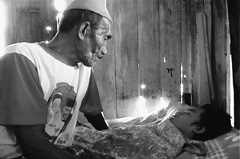Crescent Moon Over the Sea
Bulan Sabit Di Tengah Laut INDONESIA / 2007 / Bajo, Indonesian / Color / Video / 63 min
INDONESIA / 2007 / Bajo, Indonesian / Color / Video / 63 min
Director: Yuli Andari
Photography: Opan Rinaldi
Editing: Aline Jusria
Production Company, Source: Benang Merah Production www.benang-merah.com | cmosdoc.multiply.com
The island of Bungin, whose name means “crescent-shaped grains of white sand,” is home to 3,000 villagers. The scenery and the lives of the islanders were transformed when a road was built connecting the fishing village to the mainland in 2003. With consumer goods and convenient transportation also came a new desire for cash income and more efficient blast fishing, which has damaged the coral reef. What hasn’t changed is a father’s love for his son, who has returned to the village after graduating from high school. The camera gently captures the slow but evident transformation of this village, and the crescent moon that continues to shine over a father and his son.
[Director’s Statement] The lives of most Indonesians are inseparable from the sea. The Bajo people are widely known as sea voyagers whose history and traditions are closely tied to the sea. Their houses stand on pillars by the sea, with small boats bound fast to them.
Crescent Moon Over the Sea is my portrait of the Bajo way of life on Bungin Island in West Nusa Tenggara. When I first went to the island to do a news report in high school in 1997, we went by a boat that could only take passengers across the water twice a day. When I visited again in 2003 a causeway connecting Bungin and the Sumbawa mainland had been built. Rapid development had taken place all over the tiny island. Boat transportation had been replaced by motorcycle, and young people were choosing to work as motorcycle repairman rather than earning a living through the sea. Ironically, the sea itself was being destroyed. Catching fish by detonation had destroyed the reef, killing the fish. The sea was no longer considered sufficient to fulfill constantly rising daily needs.
I conducted field observation on the island for three years, and then started production at the end of 2007, exactly ten years after my first visit. I lived on Bungin Island for a half year to produce the film. Throughout these years, I shared my time with the Makkadia clan, a Bajo family that has recognized me as a close relative. Through them, I was exposed to the myths, ancestors, and Bajo traditions. In this family, I observed a great dilemma: the strain between preserving the old Bajo traditions and slowly allowing the changing face of time to erode the traditions of the sea. It is a dilemma that represents the larger dilemma of Indonesia.
 Yuli Andari
Yuli AndariBorn in 1980 in Sumbawa Besar, West Nusa Tenggara, Indonesia, Andari graduated from the department of communications at Gadjah Mada University in Yogyakarta. Her first documentary, Beauty is Pain, was produced in 2005 after she participated in a documentary workshop for beginners. Several months later, her second documentary, Little Jockey, won the 2005 Eagle Award for the best television documentary on Metro TV (Indonesia); it also won the viewer choice award. In November 2006, Little Jockey won the prize for best direction in the Asian Competition section of the Tehran International Short Film Festival. Since then, Andari has continued to make documentary films that have been screened at various film festivals and local government events. Currently she works as a researcher at the KUNCI Cultural Studies Center in Yogyakarta and runs a production house named Benang Merah Production. |
